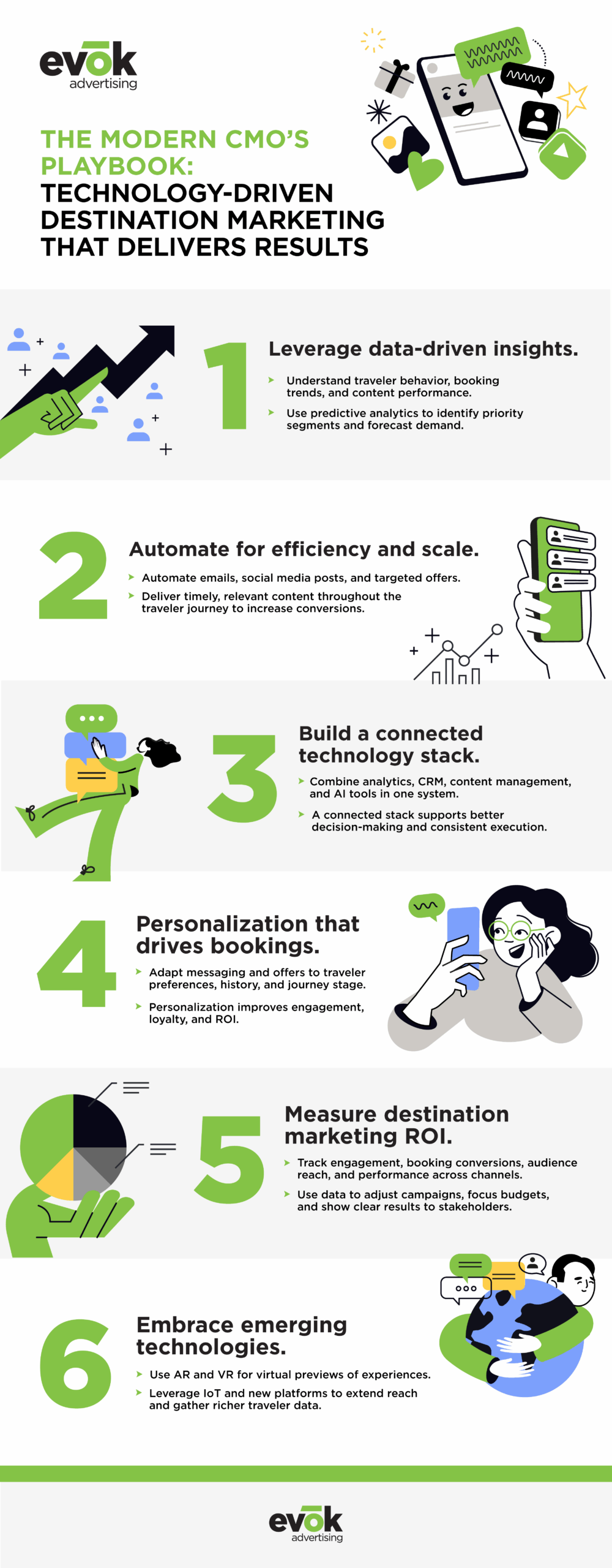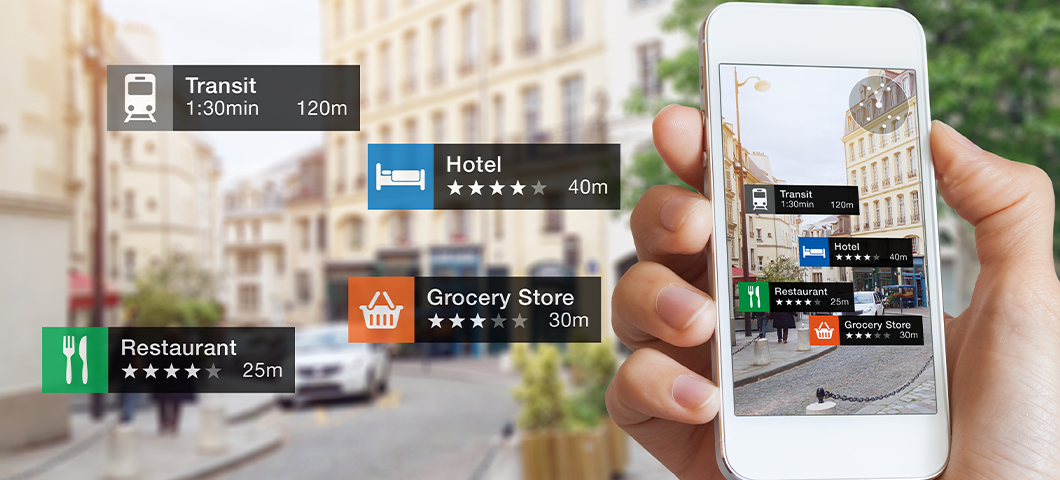
The Modern CMO’s Playbook: Technology-Driven Destination Marketing That Delivers Results
Destination marketing is no longer just about showcasing beautiful landscapes or iconic attractions. CMOs are under pressure to prove measurable results while standing out in an increasingly competitive travel market. The destinations that succeed today are those that harness technology-driven destination marketing to make smarter decisions, personalize campaigns, and optimize ROI across every channel.
Data-driven insights, AI-powered analytics, and travel marketing automation allow marketing teams to understand visitor behavior, tailor experiences, and track performance in real time. These capabilities give CMOs the tools to transform raw data into actionable strategies that drive engagement, bookings, and long-term loyalty.
This blog explores how to improve destination marketing ROI by detailing how modern CMOs build effective destination marketing strategies using technology, offering insights that serve as a practical CMO marketing playbook for the evolving travel industry. We will cover the ways data informs campaigns, how integrated technology stacks improve efficiency, and how personalization and performance metrics can deliver measurable ROI. By the end, you will see how a destination marketing agency like evok can guide your organization to leverage these tools to achieve competitive advantage and lasting results.

How Modern CMOs Use Technology to Boost Destination Marketing ROI
For CMOs leading destination marketing organizations, maximizing ROI requires more than intuition and creative campaigns. Technology now plays a central role in shaping strategies that reach the right travelers at the right time. By leveraging marketing technology for tourism, CMOs can turn large volumes of visitor data into actionable insights, track performance across channels, and make informed decisions that drive measurable results.
Organizations that embrace destination marketing analytics can identify trends, forecast demand, and prioritize campaigns that generate the highest impact, unlocking smarter decision-making for destination marketers. These insights allow marketing teams to optimize messaging, target specific audience segments, and continuously refine strategies to improve destination marketing ROI.
In addition to analytics, travel marketing automation is transforming how CMOs engage audiences. Automated campaigns enable personalized communications at scale, nurture leads over time, and free marketing teams to focus on strategy and creative execution. Tools powered by AI and predictive analytics help anticipate traveler behavior, ensuring campaigns resonate with the right audience at the right moment.
Integrating a comprehensive destination marketing strategy with advanced technology is now essential for competitive advantage. Agencies can guide organizations in selecting and implementing the right tools, ensuring campaigns deliver measurable, long-term results.
Leveraging Data-Driven Insights for Smarter Destination Strategies
Data is more than numbers; it’s the roadmap for effective campaigns. CMOs who leverage destination marketing analytics gain a clear understanding of traveler behavior, booking patterns, and content engagement, allowing them to make informed strategic decisions. This level of insight ensures marketing budgets are allocated efficiently and campaigns resonate with the right audiences.
AI-powered tools and predictive analytics are transforming how DMOs approach planning and segmentation. By analyzing historical visitor data alongside real-time trends, marketing teams can anticipate demand, identify high-value segments, and tailor campaigns to maximize engagement. This approach not only improves destination marketing ROI but also enhances the overall traveler experience by delivering relevant content at the right moment.
Data-driven strategies also enable CMOs to continuously test and optimize campaigns. Performance metrics such as click-through rates, booking conversions, and engagement duration provide actionable insights, helping marketing teams refine messaging and creative in real time. By embedding destination marketing analytics into every stage of the campaign process, organizations can move from reactive to proactive marketing, turning insights into measurable results. For CMOs aiming to stay ahead, leveraging advanced analytics and expert insights can transform complex data into actionable strategies that boost both engagement and ROI.
Marketing Automation for DMOs to Increase Engagement
Travel marketing automation has become a cornerstone for destination marketing organizations seeking to engage audiences efficiently and at scale. By automating repetitive tasks such as email campaigns, social media scheduling, and visitor segmentation, CMOs can focus on strategy and creative execution while ensuring consistent communication with potential travelers.
Automation also enables marketing personalization for destinations, delivering tailored content that aligns with a traveler’s interests, past behavior, and stage in the journey. For example, automated workflows can send customized itineraries, promotions, or local experience recommendations, creating a more relevant and engaging experience for each visitor. This level of personalization directly contributes to improved destination marketing ROI by increasing conversions and nurturing long-term loyalty.
Integrating automation with predictive analytics allows DMOs to anticipate visitor behavior and optimize campaigns in real time. Automated triggers can respond to changes in booking patterns, seasonal trends, or engagement metrics, ensuring campaigns remain timely and impactful. By embedding travel marketing automation into the overall destination marketing strategy, CMOs can deliver more consistent results, strengthen the destination brand, and achieve measurable growth. Partnering with a destination marketing agency like evok can help organizations implement automation tools effectively, aligning technology with strategy to increase engagement, efficiency, and ROI across all channels.
Building a Technology Stack That Drives Destination Success

A modern destination marketing strategy, essential for digital transformation destination marketing, relies on a cohesive technology stack that connects data, automation, and creative execution. For CMOs, this means combining analytics platforms, CRM systems, content management tools, and AI-powered solutions to gain a complete view of traveler behavior and campaign performance. A well-integrated stack not only streamlines operations but also improves destination marketing ROI by enabling data-driven decisions across every channel.
Analytics platforms provide insights into audience trends, booking patterns, and engagement metrics, helping marketing teams identify opportunities and optimize campaigns in real time. CRMs allow for precise tracking of traveler interactions and facilitate marketing personalization for destinations, ensuring campaigns reach the right audience with the right message. Content management systems and automation tools further improve efficiency, enabling the timely delivery of campaigns and consistent messaging across digital touchpoints.
Adding AI to the stack brings predictive capabilities, helping CMOs anticipate traveler behavior, forecast demand, and adjust campaigns for maximum impact. The combination of automation, analytics, and AI ensures that marketing efforts are both efficient and effective, supporting measurable results and a stronger connection with potential visitors.
Integrating AI-Powered Tools to Enhance Visitor Experience
AI-powered tools are reshaping how destination marketing organizations engage travelers. By analyzing booking patterns, website behavior, and social interactions, AI can deliver personalized recommendations, tailored itineraries, and targeted promotions that increase engagement and conversion. These insights allow CMOs to anticipate visitor preferences and deliver relevant content at the optimal moment in the travel journey.
Beyond personalization, AI enhances operational efficiency. Chatbots, automated messaging, and dynamic content generation reduce manual work while maintaining consistent engagement with prospective travelers. Predictive models also help marketing teams forecast demand, identify peak travel periods, and allocate resources where campaigns will have the greatest impact.
Incorporating AI into a destination marketing technology stack empowers CMOs to enhance the visitor experience, improve destination marketing ROI, and strengthen the destination brand by delivering meaningful, timely interactions that resonate with modern travelers.
Ensuring Sustainability with Technology-Driven Practices
Sustainability is becoming a key consideration in destination marketing, and technology plays a critical role in helping DMOs adopt eco-friendly practices. Tools that track resource usage, monitor visitor flows, and analyze environmental impact allow CMOs to make informed decisions that balance growth with sustainability. This approach aligns marketing efforts with responsible tourism principles while maintaining engagement and ROI.
Technology also enables marketing teams to promote sustainable initiatives effectively. Personalized campaigns can highlight eco-friendly experiences, responsible travel options, and community-based activities, appealing to travelers who value sustainability. AI-driven analytics can measure the impact of these campaigns, showing which messages resonate and how sustainable offerings influence bookings.
By integrating sustainability into a destination marketing technology stack, CMOs can create campaigns that reflect responsible tourism values, differentiate their destination, and maintain a positive brand image. Technology ensures that these efforts are measurable, efficient, and capable of generating meaningful engagement with modern travelers.
Personalization and Performance Metrics for Modern Destination Marketing

Modern travelers expect experiences tailored to their preferences, and CMOs are using marketing personalization for destinations to meet these expectations. By leveraging data from multiple sources such as website interactions, booking history, and social engagement, destination marketing organizations can create campaigns that resonate with individual travelers. Personalization improves engagement, increases conversions, and strengthens brand loyalty, making it a crucial component of any destination marketing strategy.
At the same time, measuring campaign effectiveness is essential for driving ROI. Destination marketing performance metrics allow CMOs to track success across channels, including social media, email, paid search, and content marketing. Metrics such as engagement rates, booking conversions, and audience segmentation insights provide actionable data that informs future strategies. Tools that combine analytics with predictive modeling allow teams to anticipate traveler behavior and optimize campaigns in real time.
Integrating personalization with performance measurement creates a feedback loop that continually improves destination marketing ROI. By analyzing which strategies drive engagement and conversions, CMOs can refine messaging, allocate budgets effectively, and ensure that campaigns consistently deliver measurable results.
Measuring ROI Across Channels for Destination Campaigns
Tracking the performance of destination marketing campaigns across multiple channels is essential for understanding what drives results. By monitoring metrics such as engagement rates, website conversions, social media interactions, and email campaign performance, CMOs can identify which efforts deliver the highest impact. This data enables marketing teams to allocate resources efficiently and make informed decisions about future campaigns.
Advanced analytics platforms allow DMOs to integrate performance data from different channels, creating a unified view of the traveler journey. This holistic approach helps CMOs identify patterns, understand audience behavior, and pinpoint areas for optimization. For instance, insights from paid social campaigns can inform email marketing strategies, while website analytics may reveal content opportunities to increase engagement.
Measuring ROI across channels ensures that every component of a destination marketing strategy contributes to tangible results. By continuously analyzing performance, CMOs can refine campaigns, improve destination marketing ROI, and maintain a competitive edge in the travel industry.
Using Predictive Analytics to Forecast Traveler Behavior
Predictive analytics is transforming how CMOs plan and execute destination marketing campaigns. By analyzing historical data, seasonal trends, and real-time engagement metrics, DMOs can forecast traveler behavior and anticipate demand. This capability allows marketing teams to launch targeted campaigns before peak booking periods, optimize budget allocation, and deliver content that resonates with specific audience segments.
Predictive models also support personalization at scale. CMOs can tailor promotions, highlight experiences most likely to interest different traveler profiles, and adjust messaging dynamically based on predicted preferences. This proactive approach increases engagement and drives higher conversion rates, ultimately improving destination marketing ROI.
By integrating predictive analytics into a destination marketing strategy, organizations can move from reactive marketing to proactive planning. This capability strengthens decision-making, maximizes campaign effectiveness, and positions destinations to respond quickly to market shifts and evolving traveler expectations.
AI-Powered Customer Insights: Transforming Destination Marketing Analytics
AI is revolutionizing how destination marketers understand their audiences, and the growth numbers are staggering. The AI tourism market is set to explode from $2.95 billion in 2024 to $13.38 billion by 2030. That’s nearly 29% growth each year.
Here’s what makes AI so powerful: it can process massive amounts of data that would take marketing teams months to analyze manually. Customer interactions, social media posts, website behavior patterns – AI turns all of this into clear predictions about what travelers want and when they’ll book.
Most DMOs already see where AI will make the biggest impact. About 49% say content creation will benefit most, while 40% believe predictive analysis will be the game-changer. Another 38% expect AI to transform how they interpret data.
But the real advantage goes beyond just analyzing data. Modern AI platforms deliver personalized experiences in real time. They predict when travelers are most likely to book, what content will grab their attention, and which campaigns will actually work. This means marketing teams can get ahead of demand instead of always playing catch-up.
The bottom line? AI transforms raw visitor data into clear action steps. Instead of guessing what works, CMOs get precise insights about ROI across all channels. Teams make smarter decisions faster, and campaigns deliver measurable results. For destination marketers ready to move beyond gut instinct, AI-powered analytics offer a competitive edge that’s hard to ignore.
Future-Proofing Your Destination Marketing with Emerging Tech

Emerging technologies are shaping the travel and tourism industry, and CMOs must stay ahead by adopting innovations. Innovations such as augmented reality (AR), virtual reality (VR), and the Internet of Things (IoT) are creating new ways for destinations to connect with travelers, showcase experiences, and stand out in a crowded market. Staying informed about travel marketing technology trends ensures campaigns remain relevant and competitive.
Emerging technologies also allow DMOs to collect more detailed insights about visitor behavior. AR and VR can simulate travel experiences before arrival, increasing interest and bookings, while IoT devices provide data that helps optimize on-site visitor experiences. CMOs can leverage these tools to enhance personalization, measure engagement, and make informed decisions about future campaigns.
Integrating emerging tech into a destination marketing technology stack ensures that marketing strategies are not only current but also adaptable. By experimenting with innovative solutions, CMOs can create more immersive campaigns, capture new audience segments, and secure long-term advantages for their destination.
AR and VR for Immersive Destination Marketing Experiences
Augmented reality (AR) and virtual reality (VR) are transforming how destinations showcase experiences and connect with travelers before they even arrive. These immersive technologies allow potential visitors to explore landmarks, attractions, and activities virtually, giving them a taste of the destination and increasing the likelihood of booking. For example, virtual tours of hotels, cultural sites, or outdoor adventures can engage travelers in a way traditional photos or videos cannot.
AR can also enhance on-site experiences by overlaying digital information onto physical locations, providing interactive guides, or offering personalized recommendations based on visitor behavior. This technology not only engages travelers but also generates valuable data that helps CMOs refine campaigns and better understand audience preferences.
By integrating AR and VR into a destination marketing strategy, organizations can create memorable, interactive experiences that strengthen the destination brand, increase engagement, and drive bookings. These technologies help CMOs deliver immersive campaigns that resonate with modern travelers and set the destination apart in a competitive market.
Video Content Performance in Destination Marketing
Video content has taken over destination marketing, and the numbers prove it works. About 91% of companies now use video as a marketing tool, and there’s a good reason why.
Travelers turn to video when planning trips. Around 65% use social media for travel inspiration. Even more interesting, 66% say movies, TV shows, and streaming services influence where they want to go. This gives CMOs a direct line to future visitors.
But here’s what really matters: the ROI is strong. Nearly 93% of marketers say video delivers good returns. That’s not all – 96% report that video helps people understand their destination better, 95% see more brand awareness, and 91% get increased website traffic.
The best part? You don’t need a massive budget to succeed. Educational and how-to videos get the highest engagement rates. High production value doesn’t guarantee better results. This means small destinations can compete with big tourism boards if they focus on good storytelling.
Video does more than showcase beautiful scenery. It shapes how travelers feel about destinations and pushes them toward booking. The key is creating content that connects emotionally while guiding viewers through their decision process. CMOs who master this approach will see video become their strongest conversion tool.
Leveraging Emerging Platforms to Expand Reach
Emerging digital platforms offer new opportunities for destination marketing organizations to reach and engage travelers. Social media channels, streaming services, and even virtual environments allow DMOs to share content, promote experiences, and connect with audiences where they spend the most time. Integrating these platforms into a destination marketing strategy ensures campaigns are visible, engaging, and aligned with traveler behavior.
AI-driven content distribution and automation tools can optimize campaigns across these platforms, delivering the right message to the right audience at the right time. Marketers can track engagement metrics in real time, test new content formats, and refine strategies based on performance data. This approach not only increases reach but also strengthens destination marketing ROI by focusing resources on channels that deliver measurable results.
By embracing emerging platforms, CMOs can expand their audience, experiment with innovative campaigns, and maintain a competitive edge in the evolving travel landscape. These technologies allow destinations to connect with modern travelers in meaningful and impactful ways.
Mobile-First Marketing: Capturing the Travel Audience on Smartphones
Mobile devices now drive most travel planning and booking decisions. In 2023, mobile traffic made up about two-thirds of all visits to travel and hospitality websites. The mobile travel booking market is growing fast, set to jump from $228.4 billion in 2024 to over $526.4 billion by 2032. That’s 11% growth each year.
But there’s a problem CMOs need to solve. While 48% of travelers use mobile phones to research destinations and 47% use them to compare prices, less than 3% actually book through mobile devices. Desktop users convert at nearly three times the rate of mobile users.
This gap creates a huge opportunity for destination marketing teams. Travelers are already on their phones looking for travel ideas and comparing options. The challenge is turning that mobile research into actual bookings. CMOs who can bridge this mobile conversion gap will capture more of the growing mobile travel market.
Mobile-first marketing means more than just having a responsive website. It requires understanding how travelers behave on mobile devices and designing campaigns that work for smaller screens, shorter attention spans, and on-the-go decision making.
The Future of Destination Marketing

Technology has become a critical driver of success in destination marketing. From AI-powered analytics and predictive modeling to AR, VR, and emerging platforms, CMOs now have the tools to deliver personalized, data-driven campaigns that engage travelers and maximize destination marketing ROI. Integrating these technologies into a cohesive destination marketing strategy allows organizations to make smarter decisions, optimize resources, and create memorable experiences that align with tourism marketing best practices, differentiating their destination in a competitive market.
Modern travelers expect relevant, seamless, and immersive experiences, and technology enables DMOs to meet those expectations at scale. By leveraging analytics, automation, AI, and immersive tools, CMOs can transform raw data into actionable insights, deliver tailored campaigns, and measure performance across channels. These strategies not only improve immediate marketing outcomes but also build long-term loyalty and strengthen the destination brand.
For CMOs ready to take their destination marketing to the next level, this CMO guide to travel marketing highlights how evok Advertising offers the expertise and technology-driven solutions to design, implement, and optimize campaigns that deliver measurable results. To learn more about how evok can help you turn data into decisions, campaigns into conversions, and your destination into a standout brand in the travel and tourism industry, contact our team of marketing specialists today.